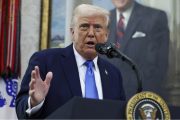
The Convention of States people are at it again. Here’s a June 5 press release promoting an upcoming “simulation” that they are hosting in Colonial Williamsburg in August:
This August, delegates representing all 50 states will gather in Colonial Williamsburg for an Article V simulated convention.
As we draw nearer to the 34-state threshold needed to call the first-ever actual interstate convention, our movement is hard at work to ensure that the nation is ready for such a momentous occasion.
Never in American history have we fully implemented the Founder’s [sic] brilliant Article V solution to government overreach (although we have come close). At the Constitutional Convention in 1787, our forefathers unanimously empowered the states with the ability to call a convention as a check and balance on federal power. It is a great tragedy that we have not exercised that power before now.
Is it a great tragedy? James Madison thought that to hold another amendments convention (because, don’t forget — that’s what the first one was supposed to be) would be worse than tragic, it would be “fatal.” In a letter to George Nicholas, Madison wrote:
Conditional amendments or a second general Convention will be fatal.
He added in that same letter the following dire prediction should an amendments convention be called:
The circumstances under which a second Convention composed even of wiser individuals, would meet, must extinguish every hope of an equal spirit of accomodation [sic]; and if it should happen to contain men, who secretly aimed at disunion, (and such I believe would be found from more than one State) the game would be as easy as it would be obvious, to insist on points popular in some parts, but known to be inadmissible in others of the Union.
In a letter to Edmund Randolph, Madison reiterated his opposition to a second convention for considering additional amendments:
I am confirmed, by a comparative view of the publications on the subject, and still more of the debates in the several conventions, that a second experiment would be either wholly abortive, or would end in something much more remote from your ideas and those of others who wish a salutary Government, than the plan now before the public.
Madison was not alone in his rejection of the idea of a second convention. How about this warning of the dangers to be expected from a second (amendments) convention, written by George Washington to the Marquis de Lafayette in 1788:
Some respectable characters have wished that the States, after having pointed out whatever alterations and amendments may be judged necessary, would appoint another federal Co[n]vention to modify it upon these documents. For myself I have wondered that sensible men should not see the impracticability of the scheme. The members would go fortified with such Instructions that nothing but discordant ideas could prevail.
And a lesser-known member of the Founding Generation, Melancton Smith, asked the following question in an address to the people of the state of New York regarding the amendments that some argued had to be made to the Constitution to control the federal government:
The amendments contended for as necessary to be made, are of such a nature, as will tend to limit and abridge a number of the powers of the government. And is it probable, that those who enjoy these powers will be so likely to surrender them after they have them in possession, as to consent to have them restricted in the act of granting them? Common sense says—they will not.
Common sense still says they will not!
Melancton Smith’s question and its answer probably have not been read by the Convention of States people; otherwise, they wouldn’t have written this ridiculous paragraph in the press release for the “simulated convention”:
Commissioner will work diligently to craft, discuss, and vote on proposed amendments that enact term limits, impose a balanced budget, and limit the scope, power, and jurisdiction of the federal government.
So, the very people who work tirelessly, shamelessly, and fearlessly to destroy our lives, liberty, and property in open, hostile, and notorious violation of both the Constitution as ratified and the many amendments to it would suddenly repent of their former tyrannical ways and become humble and penitent possessors of limited power, power that they now exercise with impunity?
Common sense says they will not.
Finally, the website devoted to advertising their “simulated convention” boasts that they will have “the opportunity to hear from Colonial Williamsburg’s character actor, Founding Father George Washington.” That sounds fun! But I wonder if the guy pretending to be George Washington is going to speak in favor of the amendments convention, or will he quote the words of the real George Washington that were quoted earlier in this article? You know, the one where the real George Washington says that at a second convention “nothing but discordant ideas could prevail”?
I’ll report back after the “simulation” is over.





